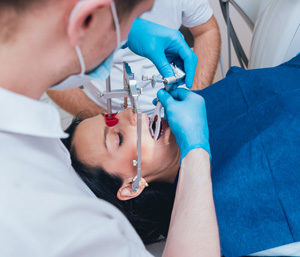What If My Implant Fails?

I was invited to give a lecture at NYU together with Dr. Olga Malkin. We presented cases that have to do with transitioning someone from a full mouth of teeth into dental implants without the use of a denture. Traditionally, someone who is losing all their teeth due to decay from dry mouth, or rampant periodontal disease, or an accident, will go through a temporary phase of wearing a removable denture. However, things have changed.
Some of my patient’s biggest year is going into a denture, especially women. It’s a Hallmark that says “now you are old”. Professor Branemark, the inventor of dental implants said that that “no one has to die with their teeth next to their bed in a glass”.
That dream he had, is now a reality. Scientific evidence has shown that dental implants placed immediately following the removal of teeth is predictable and highly successful. Our lecture and NYU showed success story after a success story of transitioning patients smoothly into All-on-4 prostheses.
One of the important questions that came up was what do we do when an implant fails, given the fact that there are four implants supporting a full set of teeth.
Even though this procedure has been over 92% successful in the last 20 years, implant failure can happen, but there are ways to get around it. What exactly does it mean when an implant fails? It either can get infected, or it gets loose from too much force. If one implant gets loose, then we simply replace and engage the prosthesis on it that same day.
But it is important to prevent these things from happening in the first place. As a patient, it is important to follow your doctor’s instructions for oral hygiene immediately post-implant placement. A pulsating water flosser, such as the Waterpik, is a must! There are lots of bacteria in your mouth that can affect the health around an implant, so it’s important to keep your mouth clean. In the first four months following implant placement, there is a period of osseointegration, when the implant fuses to the bone. During this time, it is important to eat soft foods and don’t overuse of them. The bone is not fully ready for maximum bite force until four months post-surgery.
To see if you’re a candidate for this dental implant procedure watch this video:
In great health,
Dr. Sanda
For more information on dental implants contact Dr. Sanda Moldovan to schedule a consultation.


